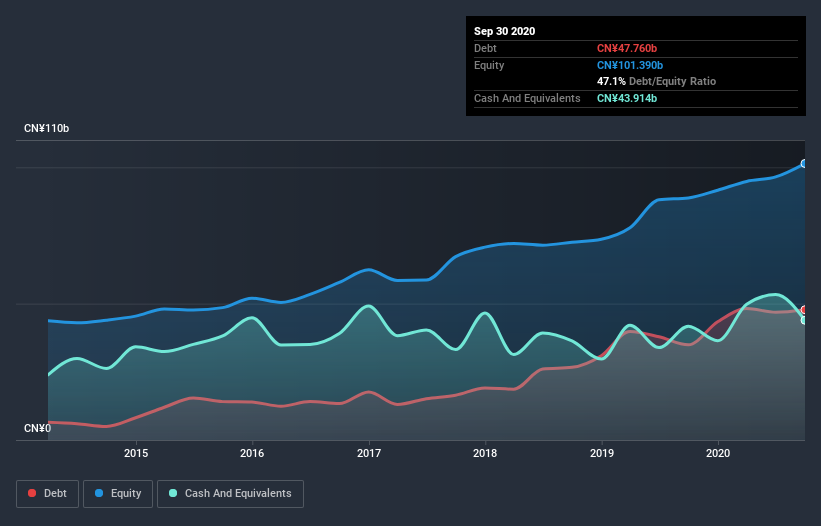- Hong Kong
- /
- Electrical
- /
- SEHK:2727
Here's Why Shanghai Electric Group (HKG:2727) Has A Meaningful Debt Burden

David Iben put it well when he said, 'Volatility is not a risk we care about. What we care about is avoiding the permanent loss of capital.' When we think about how risky a company is, we always like to look at its use of debt, since debt overload can lead to ruin. We note that Shanghai Electric Group Company Limited (HKG:2727) does have debt on its balance sheet. But is this debt a concern to shareholders?
When Is Debt Dangerous?
Debt is a tool to help businesses grow, but if a business is incapable of paying off its lenders, then it exists at their mercy. Part and parcel of capitalism is the process of 'creative destruction' where failed businesses are mercilessly liquidated by their bankers. However, a more usual (but still expensive) situation is where a company must dilute shareholders at a cheap share price simply to get debt under control. Of course, debt can be an important tool in businesses, particularly capital heavy businesses. When we think about a company's use of debt, we first look at cash and debt together.
Check out our latest analysis for Shanghai Electric Group
How Much Debt Does Shanghai Electric Group Carry?
You can click the graphic below for the historical numbers, but it shows that as of September 2020 Shanghai Electric Group had CN¥47.4b of debt, an increase on CN¥34.9b, over one year. However, it also had CN¥43.9b in cash, and so its net debt is CN¥3.51b.

A Look At Shanghai Electric Group's Liabilities
According to the last reported balance sheet, Shanghai Electric Group had liabilities of CN¥184.8b due within 12 months, and liabilities of CN¥26.9b due beyond 12 months. Offsetting this, it had CN¥43.9b in cash and CN¥93.8b in receivables that were due within 12 months. So its liabilities outweigh the sum of its cash and (near-term) receivables by CN¥74.0b.
This deficit is considerable relative to its very significant market capitalization of CN¥77.4b, so it does suggest shareholders should keep an eye on Shanghai Electric Group's use of debt. This suggests shareholders would be heavily diluted if the company needed to shore up its balance sheet in a hurry.
We measure a company's debt load relative to its earnings power by looking at its net debt divided by its earnings before interest, tax, depreciation, and amortization (EBITDA) and by calculating how easily its earnings before interest and tax (EBIT) cover its interest expense (interest cover). Thus we consider debt relative to earnings both with and without depreciation and amortization expenses.
While Shanghai Electric Group's low debt to EBITDA ratio of 0.47 suggests only modest use of debt, the fact that EBIT only covered the interest expense by 6.9 times last year does give us pause. So we'd recommend keeping a close eye on the impact financing costs are having on the business. Shanghai Electric Group's EBIT was pretty flat over the last year, but that shouldn't be an issue given the it doesn't have a lot of debt. When analysing debt levels, the balance sheet is the obvious place to start. But ultimately the future profitability of the business will decide if Shanghai Electric Group can strengthen its balance sheet over time. So if you want to see what the professionals think, you might find this free report on analyst profit forecasts to be interesting.
But our final consideration is also important, because a company cannot pay debt with paper profits; it needs cold hard cash. So we clearly need to look at whether that EBIT is leading to corresponding free cash flow. During the last three years, Shanghai Electric Group burned a lot of cash. While that may be a result of expenditure for growth, it does make the debt far more risky.
Our View
Mulling over Shanghai Electric Group's attempt at converting EBIT to free cash flow, we're certainly not enthusiastic. But on the bright side, its net debt to EBITDA is a good sign, and makes us more optimistic. Overall, we think it's fair to say that Shanghai Electric Group has enough debt that there are some real risks around the balance sheet. If everything goes well that may pay off but the downside of this debt is a greater risk of permanent losses. There's no doubt that we learn most about debt from the balance sheet. However, not all investment risk resides within the balance sheet - far from it. For instance, we've identified 4 warning signs for Shanghai Electric Group that you should be aware of.
Of course, if you're the type of investor who prefers buying stocks without the burden of debt, then don't hesitate to discover our exclusive list of net cash growth stocks, today.
When trading Shanghai Electric Group or any other investment, use the platform considered by many to be the Professional's Gateway to the Worlds Market, Interactive Brokers. You get the lowest-cost* trading on stocks, options, futures, forex, bonds and funds worldwide from a single integrated account. Promoted
New: Manage All Your Stock Portfolios in One Place
We've created the ultimate portfolio companion for stock investors, and it's free.
• Connect an unlimited number of Portfolios and see your total in one currency
• Be alerted to new Warning Signs or Risks via email or mobile
• Track the Fair Value of your stocks
This article by Simply Wall St is general in nature. It does not constitute a recommendation to buy or sell any stock, and does not take account of your objectives, or your financial situation. We aim to bring you long-term focused analysis driven by fundamental data. Note that our analysis may not factor in the latest price-sensitive company announcements or qualitative material. Simply Wall St has no position in any stocks mentioned.
*Interactive Brokers Rated Lowest Cost Broker by StockBrokers.com Annual Online Review 2020
Have feedback on this article? Concerned about the content? Get in touch with us directly. Alternatively, email editorial-team (at) simplywallst.com.
About SEHK:2727
Shanghai Electric Group
Provides industrial-grade eco-friendly smart system solutions in Mainland China and internationally.
Undervalued with excellent balance sheet.

